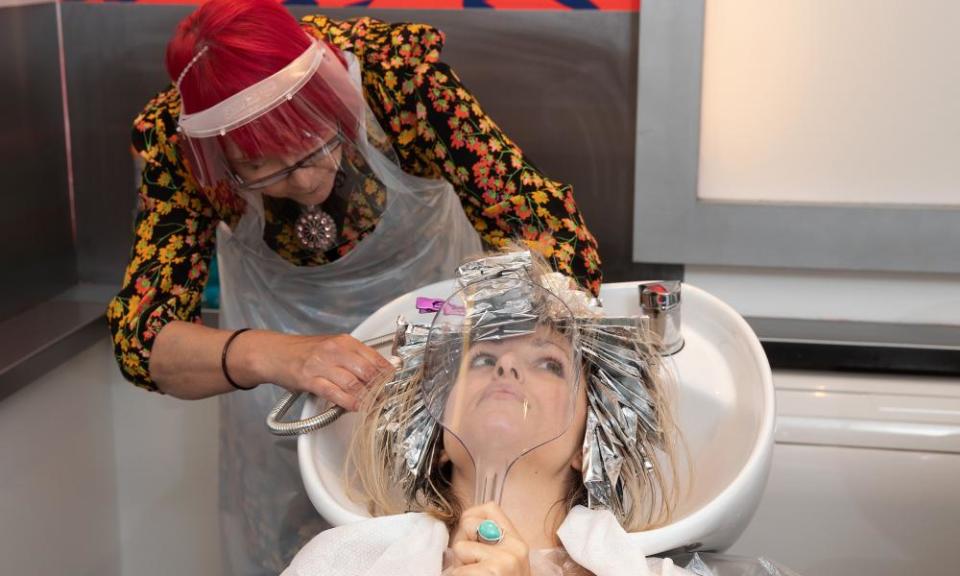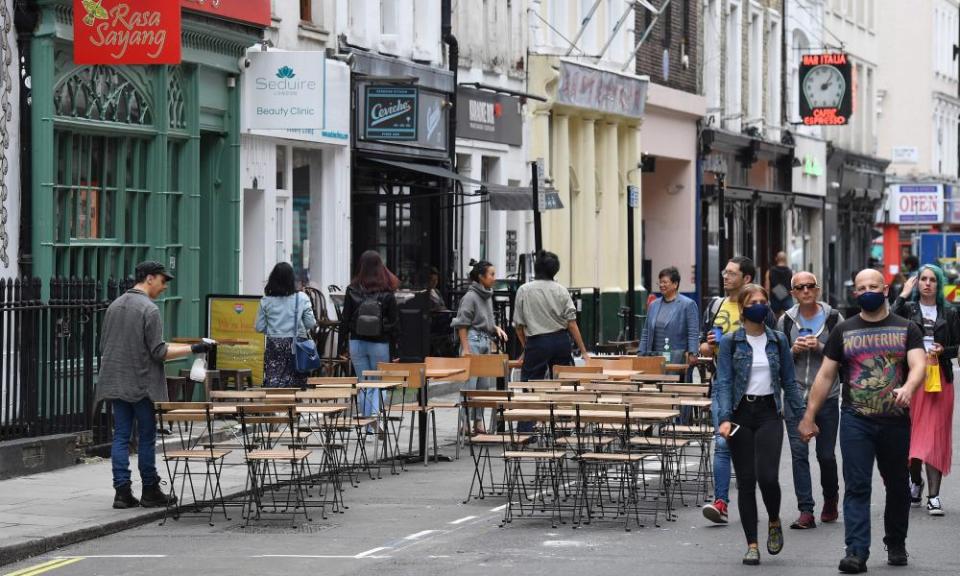Unlocked and uncertain, the brave head out for a pint and a haircut

Supporters of the boxer Ricky Hatton used to insist on approaching his fights with the same mantra: “Win or lose, we’re on the booze!” Even if their man took a pasting, they would make sure they knocked a few pints back.
It was in something like that spirit that regulars and diehards returned to the pubs in England and Northern Ireland that opened for business on Saturday.
The country has been on the ropes for most of the past four months, soaking up punches, some thrown by the Covid-19 virus, some by the government’s disastrous response to it. When the country went into lockdown, scientific advisers suggested that 20,000 deaths would represent a win. As it stands, by the most conservative estimates, we have staggered past double that number of fatalities and are still very much counting. That first pulled pint of the summer no doubt came as a relief to some – not least the million people who returned to work in bars and restaurants – but few could see it as any justified cause for celebration.
That wasn’t how Boris Johnson imagined it, of course, when he decided that the easing of restriction and the collapse of the two-metre distancing rule would take place on a summer weekend. He leads a government that has much more interest in victory parades and “independence days” than the hard decision-making that enables them.
Rishi Sunak, his teetotal chancellor, had been co-opted into feigning excitement at the reopening of an estimated 23,000 pubs, tweeting about getting the beers in. Even the tabloid press was sceptical of that message, however. The Sun may have suggested that “gasping punters will sink 15 million pints from 6am today when England’s pubs reopen for the first time in four months”, but its front page was unusually cautious rather than raucous: “It’s sup to you” it suggested, of the challenge to physical distancing that the easing represented.

On Saturday lunchtime, I walked down from my home in north London to Soho in the heart of the West End, four of five miles away – a walk I last did just over 14 weeks ago, before the shutdown. The capital, like the rest of the country, has been much changed by the events of the past three months. Many shops and restaurants remain sadly boarded up; some have closed for good. In those that were opening, staff were getting to grips with the faff of spray detergent, and security guards were contemplating days and weeks of telling people to walk one side of a barrier and not the other. I half-expected banners announcing two-for-one offers and happy hours, but the only signs were those setting out the restrictions on table service and toilets. “No service at the bar! No cuddles and kisses yet!” Several publicans, more prudent than politicians, had opted to open later in the week.
The only queues were for barbers: the hirsute snaking along pavements, pushing lockdown fringes out of their eyes. Predictably, given the vagueness of the advice, different hair salons in the same street had interpreted the guidance in different ways. Some had Perspex screens between chairs, some did not. Some hairdressers wore visors, some did not. Some had customers waiting outside, some had them packed thigh to thigh on seats inside, arrangements that now induce an involuntary wince.
After the restrictions of the last weeks, fresh air still seems to represent a measure of security. Those cafes that could had opened up frontages. It is hard not to view the dark back bars of Victorian pubs with a degree of plague-Mary alarm.
In Soho itself, there was a wait-and-see atmosphere; less “super” than “uncertain” Saturday. The main streets of the district have been pedestrianised for the summer to allow outdoor seating, but for the first day not many bars and restaurants had taken advantage of the change. The theatres that are the lifeblood of many of the eateries remain depressingly shut. In Chinatown, the anxiety levels seemed a little higher; the few restaurants open were handing out masks, and the supermarkets were policed by guards wielding electronic thermometers. Deliveroo riders and a few hopeful tuk-tuk drivers gaggled on corners, waiting for a call.

An hour or so after it opened, I had a first beer outside the French House pub, which has been saved from closure by a crowdfunding operation that raised £80,000 to pay a rent bill. In the upstairs room here, 80 years ago, General de Gaulle strategised the first stirrings of the resistance. Now all the plotting is concerned with how to stay in business. Regulars push through the familiar door with an unfamiliar trepidation. Lesley Lewis, landlady here for 30 years, wasn’t expecting to open until September, but she thought she had to give it a go. She was expecting a crowd on this first night, but it was anyone’s guess who would show up.
From the early drinkers I spoke to, there were far more expressions of the weariness I recognise in myself than any kind of cheery relief. Sipping that first pint, I reread the story I had written for this paper at the time that restrictions were first imposed. Some of the novelties and obsessions of that time have long become old hat. Those of us working at home have got bored by our Zoom backgrounds. Stockpiles of loo rolls might finally be running low. Exercise resolutions have come and gone. The blitz spirit of Clap for Carers foundered for many at Barnard Castle.
At the end of last week, Boris Johnson, mindful of the debacle of Bournemouth beach, felt the belated need to try to damp down any expectations that it was now party time. I doubt he has to remind most of us. A nation of armchair epidemiologists understands only too well that we are leaving lockdown with a higher reported daily Covid death rate than when we entered it. The R-rate in London hovers again near 1. We are grateful that the NHS has survived the crisis, but we know that the care system has not.
As a result, it appears only a vocal minority want to drink to forget, as the government might hope. The rest have long tired of hearing about world-beating whack-a-mole; they want a test-and-trace programme that isolates infected people and allows the country to get back to work.
Until that happens, as the mood of this Saturday in London suggests, ever-changing versions of comedian Matt Lucas’s pitch-perfect parody of the prime minister’s riddling advice will continue to circulate in all of our heads. “Don’t go to pubs, go to pubs; don’t go on public transport, go to work; go outside, don’t go outside; and then we will or won’t… something or other”.

 Yahoo Finance
Yahoo Finance 